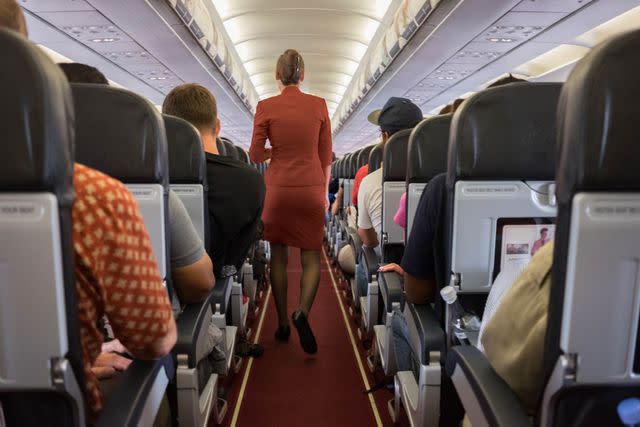5 Dirtiest Parts on a Plane, According to Flight Attendants
You may want to put on hand sanitizer before reading this.
Nearly three million passengers fly across the United States every day, according to the Federal Aviation Administration, and millions more travel across the globe. Those planes must get turned around quickly, and while dedicated cleaning crews do their best to scrub every seat before the next passengers file in, things can sometimes get missed or stay a little dirty from flight to flight. And, according to flight attendants, there are a few spots you may want to avoid, or at least use hand sanitizer after touching.
Here are five of the dirtiest places on a plane.

Peter Bannan/Getty Images
Instruction Cards
“The dirtiest spot on a plane is the safety instruction card in the seat pocket,” Josephine Remo, a flight attendant and travel blogger, shared with Travel + Leisure. And while Remo notes the tray tables do usually get wiped down (more on that later), the instruction cards do not. So, once you’re done reading the safety instructions, make sure to put on a little hand sanitizer — or better yet, wipe down the instruction card with a wet wipe to save you and future passengers from any germs.
Overhead Bin
Additionally, Remo said, it’s key to either wipe down or use a cloth to open the overhead compartments, as they are “touched by a lot of people,” and “rarely cleaned.” While it’s tough to avoid them, once you’re done loading your carry-on, simple use some hand sanitizer once again.
Tray Tables
“Passengers generally know airplanes are riddled with [grime], but the [tray tables] go beyond general germs,” said Sue Fogwell, a flight attendant with more than two decades of experience. Suffice to say, it’s a good idea to give your tray table a good wipe once you get on board, especially before eating. Fogwell isn’t the only one sharing this information. A 2015 study by Travelmath showed that tray tables had nearly eight times more bacteria per square inch than the second-dirtiest place: the overhead air vent button.
Seat Covers
“The seat covers aren't always replaced or cleaned,” Fogwell added, explaining that they will only get replaced or cleaned if they have been reported. But even then, it could be a toss-up. “Not every gross event is reported [as] it could create a flight delay,” she said. For those who can’t bear the thought of an icky seat, there are plenty of disposable and reusable seat covers on the market.
Bathroom Handles
"The toilets are regularly cleaned, but the locks and door handles are not," Remo explained. For this reason, Remo noted, "It's a good idea for passengers to use hand sanitizer after stowing away their luggage, touching anything in the seat pocket in front of them, and going to the bathroom."
And Remo is not the only one to make this claim: In October 2023, reporter Andrea Sachs collected samples from across an aircraft and found the lavatory sink handle to be the grimiest, followed by — you guessed it — the tray table.
There is one more thing you might not want to touch on your next flight: the ice. As T+L previously reported, a 2019 peer-reviewed study by the Hunter College NYC Food Policy Center at the City University of New York showed the drinking water on planes as potentially unsafe for humans. The study scored 10 major airlines from 0 to 5 and found that seven out of 10 scored a three or below.
"My takeaway from doing the research was to not drink the coffee and tea at all," Charles Platkin, Ph.D., JD, MPH, and the executive director of the Hunter College NYC Food Policy Center, told T+L. He had one more piece of advice for those airplane bathrooms: "I don't wash my hands either. I have wipes that I use."
For more Travel & Leisure news, make sure to sign up for our newsletter!
Read the original article on Travel & Leisure.

